
BIOTECHNOLOGIE AGRONOMIE SOCIETE ET ENVIRONNEMENT
Scope & Guideline
Pioneering Research in Agronomy and Biotechnology
Introduction
Aims and Scopes
- Agroecological Practices:
Research highlighting sustainable agricultural practices, including agroforestry, crop rotation, and organic farming techniques, aimed at enhancing food security and ecosystem health. - Biodiversity and Conservation:
Studies centered on the conservation of plant and animal species, understanding their ecological roles, and promoting biodiversity within agricultural systems. - Food Safety and Quality:
Investigations into food production processes, including quality assessment, contamination risks, and the development of sustainable food systems to ensure safety and nutrition. - Pest and Disease Management:
Focus on integrated pest management strategies, evaluating the efficacy of biological control methods and the impact of pests on crop yields. - Socio-economic Impacts of Agriculture:
Research examining the socio-economic dimensions of agricultural practices, including farmer knowledge systems, market access, and the role of agriculture in rural development. - Biotechnological Innovations:
Exploration of biotechnological applications in agriculture, such as genetic engineering, microbial applications, and advancements in crop resilience.
Trending and Emerging
- Climate Resilience and Adaptation:
A growing number of studies are focusing on how agricultural systems can adapt to climate change, including resilience strategies and sustainable practices that mitigate environmental impacts. - Agroforestry and Sustainable Land Use:
Research on agroforestry systems is gaining traction, emphasizing their role in enhancing biodiversity, improving soil health, and contributing to sustainable livelihoods. - Microbial Applications in Agriculture:
There is an increasing focus on the use of beneficial microorganisms in agriculture, including biofertilizers and biopesticides, reflecting a shift towards sustainable agricultural inputs. - Socio-ecological Systems and Farmer Participation:
Emerging research emphasizes participatory approaches involving local communities in agricultural decision-making, recognizing the importance of social dynamics in sustainable agriculture. - Food Security and Nutrition:
Recent publications are increasingly addressing the intersection of agriculture and food security, focusing on strategies to enhance nutrition and access to food in vulnerable populations.
Declining or Waning
- Traditional Agricultural Knowledge:
While previously a focus, recent publications suggest a decline in studies centered on traditional agricultural practices and knowledge systems, possibly due to a shift towards more technologically driven approaches. - Invasive Species Studies:
Research on invasive species and their management has decreased, possibly reflecting a growing consensus on the need for integrated ecological approaches rather than singular focus on invasive species. - Chemical Fertilization Techniques:
There appears to be a reduced emphasis on studies focusing solely on chemical fertilizers, as the journal increasingly promotes organic and sustainable alternatives. - Single Crop Systems:
Research dedicated to single crop systems is less prominent, with a noticeable shift towards multi-crop and agroecological approaches that enhance resilience and biodiversity. - Historical Agricultural Practices:
Studies examining historical practices in agriculture have diminished, indicating a move towards contemporary issues and future-oriented solutions in agricultural research.
Similar Journals
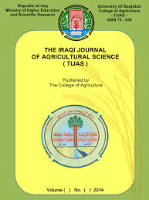
Iraqi Journal of Agricultural Sciences
Advancing agricultural innovation for a sustainable future.The Iraqi Journal of Agricultural Sciences, published by the College of Agricultural Engineering Sciences, University of Baghdad, is a prominent open-access journal that has been disseminating valuable research in the fields of agricultural and biological sciences since 2005. With an ISSN of 0075-0530 and an E-ISSN of 2410-0862, this journal serves as an essential platform for scholars to share their findings and advancements in various disciplines, including animal science, horticulture, and food science. Recognized for its excellence, the journal achieved Q1 ranking in multiple categories, reflecting its significant contribution to the scientific community and its impact within Scopus rankings. It is particularly dedicated to fostering research that addresses local and global agricultural challenges and promotes sustainable practices in Iraq and beyond. As a pivotal resource for researchers, professionals, and students alike, the Iraqi Journal of Agricultural Sciences invites submissions that advance our understanding of agricultural sciences while supporting the open dissemination of knowledge in this vital sector.
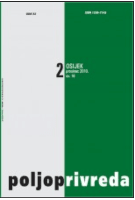
Poljoprivreda
Exploring the frontiers of agriculture since 2000.Poljoprivreda is a distinguished open-access journal dedicated to the field of agronomy and crop science, published by the FAC Agriculture Osijek in Croatia. Since its inception in 2000, the journal has been committed to disseminating high-quality research that informs both academic and practical advancements in agriculture. With an ISSN of 1330-7142 and an E-ISSN of 1848-8080, Poljoprivreda provides a vital platform for researchers, professionals, and students to engage with the latest findings and methodologies in agronomy, contributing significantly to the enhancement of agricultural practices in Croatia and beyond. Although currently ranked in the 22nd percentile within its category according to Scopus, the journal aspires to elevate its standing by welcoming innovative research that addresses contemporary challenges within the agricultural sciences. By fostering open access since 2000, Poljoprivreda ensures that its scholarly content is freely available, promoting wider dissemination and collaborative opportunities among researchers globally.
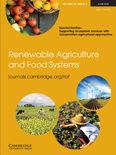
RENEWABLE AGRICULTURE AND FOOD SYSTEMS
Pioneering interdisciplinary approaches to food sustainability.RENEWABLE AGRICULTURE AND FOOD SYSTEMS, published by Cambridge University Press, is a leading open-access journal dedicated to the advancement of sustainability in agricultural practices and food systems. With an ISSN of 1742-1705 and an E-ISSN of 1742-1713, this journal spans the interdisciplinary fields of agronomy and food science, achieving a commendable Q2 ranking in both categories for 2023. As it continues to converge through the years from 2004 to 2024, the journal offers a platform for researchers, professionals, and students to disseminate transformative research that addresses the challenges of food security, resource management, and environmental impact. The journal’s significant impact is underscored by its Scopus rankings, situating it in the 77th percentile among agronomy and crop science publications, and the 67th percentile in food science. Since becoming fully open access in 2023, RENEWABLE AGRICULTURE AND FOOD SYSTEMS promotes wider accessibility to vital research findings, fostering collaboration and innovation in the pursuit of sustainable agricultural practices and food systems worldwide.

AIMS Agriculture and Food
Advancing sustainable practices in agriculture and food.AIMS Agriculture and Food is a leading open access journal published by the American Institute of Mathematical Sciences (AIMS), focused on the critical intersections of agricultural and food sciences. Since its inception in 2016, this journal has provided a vital platform for disseminating innovative research and advancements in the fields of agricultural and biological sciences and food science. With impressive Scopus rankings, including a Q2 categorization in 2023 for both Agricultural and Biological Sciences (miscellaneous) and Food Science, AIMS Agriculture and Food is recognized for its significant contributions to the academic community. The journal aims to foster interdisciplinary dialogue by welcoming submissions that tackle contemporary challenges, promote sustainable practices, and enhance food security. Researchers, professionals, and students will find this journal an invaluable resource, offering open access to high-quality, peer-reviewed articles that are essential for informed decision-making in agriculture and food industries.
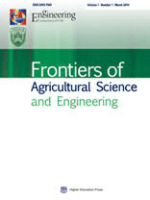
Frontiers of Agricultural Science and Engineering
Advancing agricultural innovation for a sustainable future.Frontiers of Agricultural Science and Engineering, published by HIGHER EDUCATION PRESS, is a distinguished open-access journal established in 2014, dedicated to advancing research across the fields of agricultural and biological sciences, biotechnology, and veterinary studies. With an impressive Q1 ranking in both Agricultural and Biological Sciences and Veterinary categories for 2023, this journal positions itself prominently within the academic landscape, reflecting the importance and quality of the research it disseminates. The journal serves as a vital platform for researchers, professionals, and students worldwide, featuring a broad array of studies that enhance our understanding of agricultural technologies, biotechnological innovations, and veterinary sciences. With a focus on rigor and accessibility, Frontiers of Agricultural Science and Engineering promotes the global exchange of knowledge, encouraging the collaboration that is essential for tackling contemporary challenges in these critical fields. Available online with a comprehensive range of article options, it continues to contribute to the scientific community's advancements in agricultural and biological disciplines.
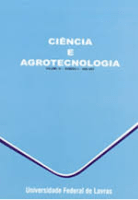
CIENCIA E AGROTECNOLOGIA
Unlocking Insights in Agronomy and Animal ScienceCIENCIA E AGROTECNOLOGIA, published by UNIV FEDERAL LAVRAS-UFLA, is a vital open-access journal since 2005 that serves as an influential platform for disseminating research in the fields of Agronomy, Animal Science, Food Science, Soil Science, and Veterinary Science. With its ISSN 1413-7054 and E-ISSN 1981-1829, this journal is recognized for its contribution to science and technology advancements in agriculture, particularly in Brazil, fostering knowledge exchange among researchers, professionals, and students. Currently ranked in the Q2 quartile for Agronomy and Crop Science, Animal Science and Zoology, and in the Q3 quartile for Food Science and Soil Science, it demonstrates a solid international standing in the relevant Scopus indices. The journal's commitment to open access ensures that critical research findings are freely available, enabling a broader impact and encouraging collaborative advancements in agritech. As the journal looks towards its converged years from 2007 to 2024, it continues to uphold its objectives of promoting sustainable practices and innovation within the agricultural sciences.

Frontiers in Agronomy
Pioneering Research for a Greener TomorrowFrontiers in Agronomy, published by FRONTIERS MEDIA SA, is a premier open-access journal dedicated to the dynamic field of agronomy. Launched in 2019, it has rapidly established itself as a leader in the publication of groundbreaking research, holding a distinguished Q1 ranking in several categories including Agricultural and Biological Sciences, Agronomy and Crop Science, Plant Science, and Soil Science as of 2023. With an impressive Scopus ranking that positions it among the top journals in its field, this journal provides a valuable platform for researchers, professionals, and students alike to disseminate and access innovative research and critical insights in agronomy. Every contribution to Frontiers in Agronomy undergoes rigorous peer review, ensuring that high-quality research remains at its core. Accessible to all since its inception, it serves as a vital resource for advancing knowledge and fostering collaboration within the global agronomic community, supporting the quest for sustainable agricultural practices and enhanced crop productivity.

AGROCHIMICA
Exploring the science behind thriving crops and healthy soils.AGROCHIMICA is an eminent journal published by PISA UNIV PRESS, dedicated to advancing the fields of Agronomy, Crop Science, Food Science, and Soil Science. With a rich history dating back to its inception in 1973, this journal has evolved through various phases of publication, illustrating its commitment to delivering quality research over several decades. Although currently categorized in the Q4 quartile across its respective disciplines, AGROCHIMICA provides a platform for foundational and innovative studies that contribute to knowledge in agricultural practices and sustainable food systems. While the journal is not open access, it remains a valuable resource for researchers, professionals, and students interested in Italy's and the global agricultural landscape, fostering a greater understanding of the complexities within these interconnected fields. The ISSN associated with this journal is 0002-1857, and it is published from Pisa, Italy, addressing the evolving challenges in agriculture with a spotlight on rigorous scientific inquiry.
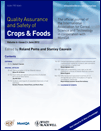
Quality Assurance and Safety of Crops & Foods
Pioneering the future of crop and food assurance.Quality Assurance and Safety of Crops & Foods is a leading peer-reviewed journal, published by CODON PUBLICATIONS, dedicated to advancing the fields of Agronomy and Crop Science and Food Science. Since its inception in 2009, this journal has established itself as a crucial platform for researchers, professionals, and students, focusing on the vital intersection of agricultural safety and food quality. With a commendable impact factor and a current Scopus ranking placing it in the top quartiles of its field (Q2 in 2023), it serves as an essential resource for those committed to ensuring the safety and quality of global food supplies. The journal provides open access options to enhance the dissemination and accessibility of research findings, thus fostering collaborative efforts to tackle contemporary challenges in food production and safety. By showcasing innovative methodologies and cutting-edge research, Quality Assurance and Safety of Crops & Foods not only contributes to scientific discourse but also plays a pivotal role in informing policy and practice in sustainable agricultural practices.

Romanian Agricultural Research
Pioneering Research in Crop Management and SustainabilityRomanian Agricultural Research is a prominent academic journal dedicated to advancing the field of agricultural science with a specific focus on agronomy and crop management. Published by the NATL AGRICULTURAL RESEARCH & DEVELOPMENT INST in Romania, this journal has established itself as an important resource within its discipline, evidenced by its Q3 ranking in the Agronomy and Crop Science category for 2023. With its ongoing publication since 2008, the journal provides a platform for researchers and professionals to disseminate their findings and share innovative practices that address the challenges faced in agricultural development. Although it operates under a non-open access model, Romanian Agricultural Research commits to rigorous peer-review processes, ensuring the high-quality content that enhances the academic community’s knowledge base. The journal's objective is to foster dialogues surrounding sustainable agriculture, improve crop yield, and contribute to the enhancement of agricultural practices globally. Researchers, professionals, and students will find this journal to be an invaluable repository of knowledge and a catalyst for future agricultural innovations.